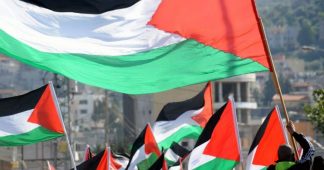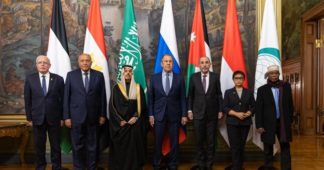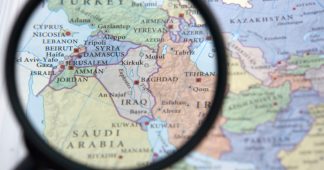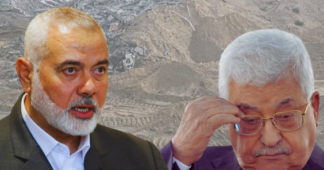By Marwan Emil Toubasi
With the convening of the emergency Arab-Islamic summit in Riyadh, we witnessed the issuance of a final statement that included several decisions to confront Israel’s acts of extermination, displacement, and aggression in Gaza and Lebanon. It affirmed support for the Palestinian people’s rights in the face of ongoing occupation crimes. While these decisions may appear strong and influential, serving as a message to the international community, especially to new President Trump, the biggest challenge lies in the political will and independence needed to implement them on the ground. This is especially true given the complexities of the current international system and regional balances, which significantly hinder the realization of tangible steps, leading to fears that these decisions, like many others from past summits, may remain mere words on paper in the absence of the will and capacity to confront.
On the other hand, the statements made by Netanyahu and Finance Minister Smotrich regarding the annexation of the West Bank and the impossibility of establishing a Palestinian state reflect the occupation government’s vision. They also serve as a challenge to the summit’s decisions and send a counter-message to Trump. These statements openly defy the summit’s calls to halt the ongoing aggression and support the establishment of a sovereign, contiguous Palestinian state on the pre-1967 borders, reflecting the long-standing Arab and Islamic consensus on Palestinian rights. Yet, enforcing these rights remains out of reach.
These statements highlight the Israeli government’s commitment to implementing its Zionist vision, posing new challenges to the region, especially as the official Israeli stance leaves no room for negotiations or political solutions. These statements could further complicate the scene and provoke reactions from regional countries seeking stability amid escalating tensions and popular discontent.
One of the summit’s main decisions was to mobilize efforts to suspend Israel’s membership in the United Nations General Assembly. This step does not require Security Council approval, but only a two-thirds majority in the General Assembly. Through this, the summit seeks to highlight Israel’s crimes and isolate it internationally, a significant approach if Arab and Islamic states can rally enough support. This is an important investment in global solidarity with the Palestinian struggle and the path to isolating Israel as a rogue state. Additionally, the summit called for an arms embargo on Israel and for supporting Egypt’s efforts to provide sustainable aid to Gaza, placing the responsibility on Egypt to apply pressure if the political will is present.
Although these decisions reflect unity and clear solidarity with the Palestinian people, we recognize this is not the first time such calls have been made in similar summits. Previous Arab and Islamic summits also included calls to boycott Israel and garner international support for Palestinians. However, the issue remains one of implementation due to the lack of political will among some states, as well as challenges posed by regional and international alliances and the political constraints imposed by U.S. administrations that obstruct Palestinian national rights.
The U.S. position remains a central challenge. The United States, whether under the Biden administration or even with a potential return of Trump, consistently provides near-absolute support for Israel and avoids pressuring it to halt its aggression or change its policies, except in cases that harm U.S. interests.
The continuation of U.S. challenges and lack of responsiveness to Arab decisions calls for alternative policies from Arab and Islamic states, such as building new alliances with emerging powers like China, Russia, BRICS, and the Shanghai Cooperation Organization, enabling them to enhance their influence and independence in decision-making. This strategy could help create a balance to counter U.S. and Israeli pressures.
Arab and Islamic states have other tools for exerting pressure, such as diplomatic boycotts, as some Latin American countries have done, or controlling oil exports and reducing economic transactions with countries that support Israel, as seen in 1973. However, adopting such policies also requires strong, bold political resolve and coordinated action among Arab and Islamic states to achieve the desired goals.
With Iran attending the summit, reevaluating Arab-Iranian relations may be a strategic step to overcome the “Iranian enemy” narrative that Israel and the United States have used for years, attempting to shift the Arab focus away from Israel. This summit could serve as a platform to build real cooperation between Arab states and Iran, rather than engaging in a draining, perpetual conflict that serves others’ interests. It could also foster a positive Iranian role that limits efforts to export revolutionary ideology to neighboring countries, in the absence of an Arab nationalist project. This would align Iran’s role with a political vision that prevents Israel from spearheading a new Middle East project under U.S. designs for geopolitical reconfiguration, and simultaneously supports a broad Palestinian unity within the framework of the Palestine Liberation Organization and its political and resistance programs as the sole legitimate representative of all Palestinians.
Arab-Islamic-Iranian cooperation, especially with Gulf neighbors, could promote greater regional stability and curb the expansion of the Abraham Accords with Israel. A model akin to the China-brokered Iran-Saudi agreement could be repeated, broadening economic and security cooperation to serve the interests of all parties. This strategy is not just an alternative to hostility but a necessity to safeguard Arab and Islamic interests, away from Western hegemony and colonial ambitions in the region, whether economic, military, or political.
In light of regional shifts and the ongoing transformations in the international order that must be built upon, there is hope for some impact, especially if Arab and Islamic countries align on unified positions and initiate serious measures to exert international pressure. But the crucial question remains: is there a genuine political will to implement these decisions?
Any decision lacking political support and determination for implementation may become another statement added to the list of unfulfilled resolutions. Therefore, the current situation demands a serious commitment to practical, continuous actions against the ongoing atrocities against our people, not merely statements or decisions without follow-up mechanisms or clear timelines for ending the occupation, which is at the root of the issues plaguing our Arab Mashreq region.
This requires a comprehensive strategic vision and new alliances that enhance Arab and Islamic independence and make their decisions more impactful within the international system through better utilization of resources and power sources.
We remind our readers that publication of articles on our site does not mean that we agree with what is written. Our policy is to publish anything which we consider of interest, so as to assist our readers in forming their opinions. Sometimes we even publish articles with which we totally disagree, since we believe it is important for our readers to be informed on as wide a spectrum of views as possible.











